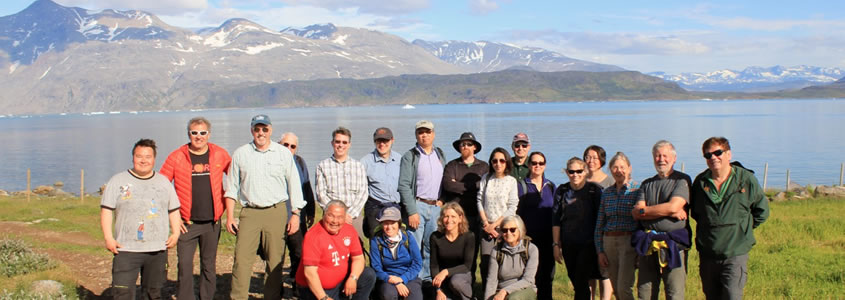By Professor Charles Norchi
 Geography favors the University of Maine School of Law. Our state strides two international borders – Canada and the Atlantic Ocean. We sit on an extensive coast in a city with an international port and a vibrant blue economy. Because of our exceptional location, our Law School has a maritime tradition unique among American law schools. The reach of Maine Law has extended across maritime routes to Europe and beyond. We have had long standing student exchanges and research collaborations in Canada, Ireland, and France. And, as of this year, the Law School has collaborations – which will directly benefit our students – in Iceland, Norway, and Greenland. The reach of our school now extends to the Arctic.
Geography favors the University of Maine School of Law. Our state strides two international borders – Canada and the Atlantic Ocean. We sit on an extensive coast in a city with an international port and a vibrant blue economy. Because of our exceptional location, our Law School has a maritime tradition unique among American law schools. The reach of Maine Law has extended across maritime routes to Europe and beyond. We have had long standing student exchanges and research collaborations in Canada, Ireland, and France. And, as of this year, the Law School has collaborations – which will directly benefit our students – in Iceland, Norway, and Greenland. The reach of our school now extends to the Arctic.
The beginning of Maine Law’s Arctic activities began in 2016 when the Arctic Council, an intergovernmental organization, met in Portland. I was a member of the host committee which entailed organizing an affiliated conference – the Maine Arctic Forum. The Forum brought Arctic experts from across the state including Professor Paul Mayewski, a prominent glaciologist who runs the Climate Change Institute at the University of Maine. Paul and I had the opportunity to consider Arctic problems from the standpoints of our respective disciplines and that led to an article, “The Arctic: Science, Law and Policy” in the Ocean & Coastal Law Journal.[1]
We recognized the further need to promote interdisciplinary research and teaching so we launched the Arctic Futures Institute (AFI) as a joint project of the Center for Oceans & Coastal Law, the Climate Change Institute, and the World Ocean Observatory, which is directed by Peter Neill. In June 2018, we held our first AFI teaching initiative – the Arctic Summer Institute – a week-long intensive course conducted between law firm Verrill and the Law School.
In 2018, I took a sabbatical in Iceland as the Fulbright-Ministry of Foreign Affairs Arctic Scholar. A research project with Professor Bjarni Magnusson of Reykjavik University became a jointly authored book chapter on “Geopolitics and International Law in the Arctic.”[2] I also published general articles, “Polar Polarity: A Letter from Iceland,”[3] and “Unlike Antarctica, There is no Arctic Treaty,”[4] taught at the Universities of Iceland and Akureyri, presented at the Arctic Circle Assembly, and joined the board of the Journal of the North Atlantic and Arctic.
 In the summer of 2019, we held our second Arctic Futures Workshop in Greenland. We brought 16 faculty and researchers from multiple disciplines to southwest Greenland through the support of the University of Maine System Research Reinvestment Fund, the USM Maine Economic Improvement Fund (MEIF), and the University of Maine Office of the Vice President for Research and Dean of the Graduate School. Many disciplines were represented on this trip – arts, sciences, and law. Our two-person law school complement included Visiting Associate Professor Jeffrey Thaler.
In the summer of 2019, we held our second Arctic Futures Workshop in Greenland. We brought 16 faculty and researchers from multiple disciplines to southwest Greenland through the support of the University of Maine System Research Reinvestment Fund, the USM Maine Economic Improvement Fund (MEIF), and the University of Maine Office of the Vice President for Research and Dean of the Graduate School. Many disciplines were represented on this trip – arts, sciences, and law. Our two-person law school complement included Visiting Associate Professor Jeffrey Thaler.
The focus of this Arctic Futures Workshop was the Kujataa UNESCO World Heritage Site. Among our goals were that our group learn about the area, interact with Greenlanders, identify common issues, and devise proposals for addressing the challenges and quality of life in the Arctic and also in Maine. The essential impact upon the area is climate change, hence the involvement of our Climate Change Institute colleagues was critical. The workshop was a catalyst for participants to develop interdisciplinary research and teaching projects. As Professor Mayewski observed, “We’ve opened doors for everything from courses to undergraduate and graduate programs to pilot studies and research.”
Maine Law continues to develop opportunities for students to participate in vital Arctic scholarship. Students can already work on scholarship as members of the Ocean & Coastal Law Journal and participate in training and research opportunities through the Arctic Futures Institute. Students can also participate in the Arctic Law Project of our Center for Oceans and Coastal Law, study the field at the Arctic University of Norway, Reykjavik University in Iceland, or the National University of Ireland. And, in early 2020 the Law School will launch an Arctic Law Fellows program.
[1] Ocean and Coastal Law Journal, May 2017. [2] Rutledge Handbook of Arctic Security, 2019 [3] Global Geneva, June 2018 [4] Journal of the North Atlantic and Arctic, June 2018
